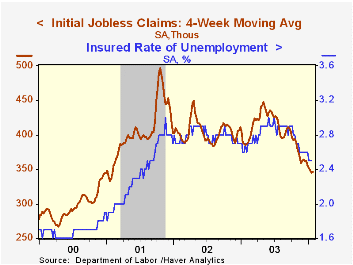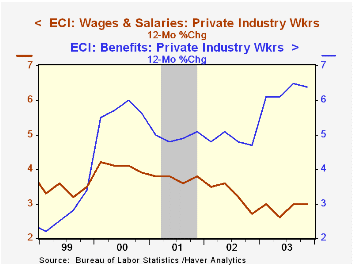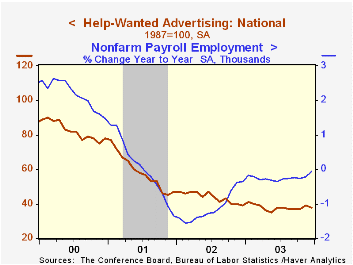 Global| Jan 29 2004
Global| Jan 29 2004Initial Claims for Jobless Insurance Flat
by:Tom Moeller
|in:Economy in Brief
Summary
Initial claims for jobless insurance nudged lower last week by 1,000 to 342,000. The prior week's level was revised up slightly. Consensus expectations had been for claims of 341,000. The four-week moving average of initial claims [...]

Initial claims for jobless insurance nudged lower last week by 1,000 to 342,000. The prior week's level was revised up slightly. Consensus expectations had been for claims of 341,000.
The four-week moving average of initial claims ticked up to 346,000 (-10.4% y/y).
Continuing claims for unemployment insurance rose 11,000 but the claimant level during the prior week was revised down to show a decrease of 7,000 instead of a slight increase.
The insured rate of unemployment was stable at 2.5% for the third week.
| Unemployment Insurance (000s) | 01/24/04 | 01/17/04 | Y/Y | 2003 | 2002 | 2001 |
|---|---|---|---|---|---|---|
| Initial Claims | 342.0 | 343.0 | -12.8% | 403 | 404 | 406 |
| Continuing Claims | -- | 3,131 | -5.9% | 3,535 | 3,575 | 3,022 |
by Tom Moeller January 29, 2004

The employment cost index for workers in private industry rose 0.7% last quarter, well below the 1.0% increase in 3Q and well below Consensus expectations for a 0.9% gain.
The 4.0% gain in compensation in 2003 was up from 3.2% in 2002 but below the gains of 2000 and 2001.
Wages and salaries, which account for roughly 70% of the compensation index, moderated last quarter to a 0.5% gain versus 0.9% in 3Q. The 3.0% gain in wages for all of last year was up slightly from 2002 but was well below the gains prevalent from 1996 to 2001.
Wage growth in blue-collar occupations moderated last year to 2.4% from 2.8% in 2002 and 3.9% in 2001. Wage growth in white-collar occupations picked up in 2003 to 3.4% versus 2.8% in 2002 but remained below the gains seen from 1996 to 2001.
Benefit costs in private industry rose 1.2% in 4Q and 6.4% in 2003. That was the fastest annual gain since 1990 and was driven by a 10.5% gain in health insurance costs that outpaced the 10.2% increase in 2002. These gains in health costs were the strongest since 1991 and jumped from a 0.9% increase in 1997.
Benefit costs in blue-collar occupations surged 7.2% last year, well above the 5.4% gain in 2002 and the 3.3% gain in 2001. That was led by a 7.9% gain in factory sector benefits. Benefit costs in non-manufacturing industries rose 5.9%, up slightly from the 4.4% rise in 2002. Benefit costs in white-collar occupations rose 5.9% last year, up from 4.5% in 2002.
| ECI- Private Industry Workers | 4Q'03 | 3Q'03 | Y/Y | 2003 | 2002 | 2001 |
|---|---|---|---|---|---|---|
| Compensation | 0.7% | 1.0% | 4.0% | 4.0% | 3.4% | 4.2% |
| Wages & Salaries | 0.5% | 0.9% | 3.0% | 3.0% | 2.7% | 3.8% |
| Benefit Costs | 1.2% | 1.4% | 6.4% | 6.4% | 4.7% | 5.1% |
by Tom Moeller January 29, 2004

The Conference Board’s National Index of Help-Wanted Advertising fell to 38 last month, down from 39 in December. The figure was improved from the low of 35 in May but was still just the average of the last seven months.
During the last ten years there has been a 93% correlation between the level of help-wanted advertising and the year-to-year change in non-farm payrolls.
The proportion of labor markets with rising want-ad volume fell sharply to 33% from 75% in November and an average of 45% for the year.
Indexes of help wanted fell throughout much of the country except in Chicago, Cincinnati and Kansas City.
The Conference Board surveys help-wanted advertising volume in 51 major newspapers across the country every month.
| Conference Board | Dec | Nov | Dec '02 |
|---|---|---|---|
| National Help Wanted Index | 38 | 39 | 39 |
Tom Moeller
AuthorMore in Author Profile »Prior to joining Haver Analytics in 2000, Mr. Moeller worked as the Economist at Chancellor Capital Management from 1985 to 1999. There, he developed comprehensive economic forecasts and interpreted economic data for equity and fixed income portfolio managers. Also at Chancellor, Mr. Moeller worked as an equity analyst and was responsible for researching and rating companies in the economically sensitive automobile and housing industries for investment in Chancellor’s equity portfolio. Prior to joining Chancellor, Mr. Moeller was an Economist at Citibank from 1979 to 1984. He also analyzed pricing behavior in the metals industry for the Council on Wage and Price Stability in Washington, D.C. In 1999, Mr. Moeller received the award for most accurate forecast from the Forecasters' Club of New York. From 1990 to 1992 he was President of the New York Association for Business Economists. Mr. Moeller earned an M.B.A. in Finance from Fordham University, where he graduated in 1987. He holds a Bachelor of Arts in Economics from George Washington University.
More Economy in Brief
 Global| Feb 05 2026
Global| Feb 05 2026Charts of the Week: Balanced Policy, Resilient Data and AI Narratives
by:Andrew Cates






